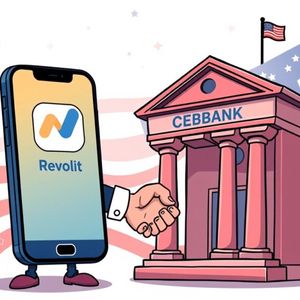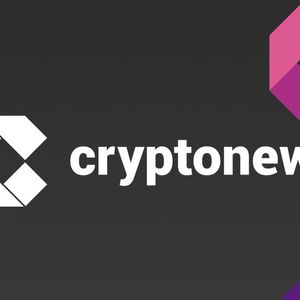BitcoinWorld Revolut Acquisition: Strategic Move to Unlock US Banking Potential The financial world is buzzing with news of a potential Revolut acquisition of a U.S. bank. This move could be a game-changer, not just for the London-based neobank, but for the entire fintech landscape, especially for those keenly watching the convergence of traditional finance and digital assets. It signals a clear intent from Revolut to deepen its roots in the lucrative U.S. market, promising a more integrated and comprehensive financial experience for its American users. Why is a National US Banking License So Crucial for Revolut’s Strategic Growth, Making This Revolut Acquisition a Game-Changer? For a neobank like Revolut, operating without a full national banking license in a market as vast and regulated as the United States presents significant limitations. Currently, Revolut relies on partnerships with existing U.S. banks to offer its services, which can restrict the scope of products, increase operational costs, and dilute its brand control. Acquiring a nationally chartered U.S. bank, as reported by the Financial Times, would fundamentally change this dynamic. Here’s why it’s a strategic imperative: Direct Deposit Insurance: A national license would enable Revolut to offer FDIC-insured accounts directly, building greater trust and confidence among consumers who prioritize security for their deposits. Expanded Product Offerings: With a license, Revolut could independently offer a broader range of financial products, including loans, mortgages, and potentially more sophisticated investment options, without needing a third-party partner. Reduced Operational Costs: Cutting out intermediary banks can lead to significant cost savings, which can then be passed on to customers through better rates or invested in product development. Full Control Over Customer Experience: Operating under its own license would give Revolut complete control over the entire banking stack, from onboarding to customer service, ensuring a seamless and consistent user experience. Enhanced Regulatory Standing: Holding a national license demonstrates a higher level of regulatory compliance and oversight, bolstering Revolut’s reputation and legitimacy in the eyes of regulators and consumers alike. How Does Revolut Currently Operate in the US, and What Limitations Does It Face Without a Full License, Prompting This Potential Revolut Acquisition ? Revolut officially launched in the U.S. in March 2020, but its operations have been somewhat constrained compared to its European footprint. Without its own banking charter, Revolut has functioned more as a financial technology company offering a front-end interface built on top of traditional banking infrastructure. This means: Reliance on Banking-as-a-Service (BaaS) Providers: Revolut partners with U.S. banks to hold customer deposits and facilitate transactions. While this allows for rapid market entry, it means Revolut doesn’t directly control the underlying banking services. Limited Autonomy: The scope of services Revolut can offer is often dictated by its partners’ licenses and risk appetites, which might not align perfectly with Revolut’s global ambitions or its innovative approach to finance. Fragmented Regulatory Landscape: Operating state-by-state with various money transmitter licenses can be cumbersome and less efficient than a single national banking license. This reliance highlights the strategic necessity of a direct banking license. A successful Revolut acquisition would be the fastest route to achieving this, bypassing the lengthy and complex process of applying for a new charter from scratch. In the Dynamic Fintech Landscape, What Makes a Traditional Bank an Attractive Target for a Revolut Acquisition ? While some fintechs opt to build their banking operations from the ground up, acquiring an existing bank offers several compelling advantages, particularly for a global player like Revolut: Instant Licensing: The most significant benefit is immediately gaining a national banking charter, which can take years to secure through new applications. Established Infrastructure: Acquired banks come with existing operational infrastructure, including core banking systems, compliance frameworks, and often, a customer base. Regulatory Relationships: An existing bank already has established relationships with regulators, which can smooth the transition and ongoing compliance efforts. Talent Pool: The acquisition brings with it experienced banking professionals who understand the intricacies of the U.S. regulatory and operational environment. This strategy isn’t unique to Revolut. Other fintech companies, such as LendingClub and SoFi, have also pursued and completed similar acquisitions to gain banking charters, illustrating a growing trend where digital natives are buying their way into the traditional banking system to unlock new growth avenues and control their destiny. What Complex Regulatory Hurdles Must Revolut Overcome to Finalize a Successful Revolut Acquisition in the Highly Regulated U.S. Banking Sector? The U.S. banking regulatory environment is notoriously complex and stringent. A Revolut acquisition of a nationally chartered bank would involve navigating multiple layers of regulatory approval: Office of the Comptroller of the Currency (OCC): As the primary regulator for national banks, the OCC would need to approve the change of control and ensure Revolut meets all prudential standards. Federal Reserve: If the acquired bank is a state member bank or a bank holding company, the Federal Reserve would also have a say. State Regulators: Even with a national charter, state-specific regulations may apply depending on the acquired bank’s operations. Anti-Money Laundering (AML) and Know Your Customer (KYC): Regulators will scrutinize Revolut’s existing AML/KYC frameworks and its ability to integrate the acquired bank’s systems to maintain robust financial crime prevention. Consumer Protection: The Consumer Financial Protection Bureau (CFPB) will ensure that the acquisition does not negatively impact consumer rights or access to financial services. Revolut’s global operations and its history with some regulatory scrutiny in other markets could lead to heightened examination from U.S. authorities. Demonstrating a robust compliance culture and a clear integration plan will be paramount for a successful outcome. How Might Consumers Benefit from a Successful Revolut Acquisition , Potentially Unlocking a Wider Array of Financial Services? For American consumers, a successful Revolut acquisition could translate into a more robust and competitive digital banking landscape. Here’s what they might gain: More Competitive Products: With direct access to the U.S. banking system, Revolut could offer more competitive interest rates on savings, lower fees, and potentially more favorable exchange rates for international transfers. Integrated Financial Hub: Revolut aims to be a super-app for finance. A national license would allow them to integrate services like direct deposit, bill pay, credit products, and even crypto trading more seamlessly under one roof. Innovation in Lending: Revolut could introduce innovative lending products tailored to digital-first consumers, leveraging its data analytics capabilities. Enhanced Crypto Offerings: While Revolut already offers crypto trading in the U.S. through partners, a direct license could pave the way for more integrated crypto services, potentially allowing for easier on-ramps and off-ramps, or even more advanced crypto-related financial products. This could significantly impact how U.S. users interact with digital assets within a regulated banking environment. What Are the Significant Challenges and Inherent Risks Associated with Such a Large-Scale Revolut Acquisition ? While the benefits are clear, the path to a successful Revolut acquisition is fraught with challenges and risks: Integration Complexities: Merging the technological infrastructure, operational processes, and corporate cultures of a digital-native neobank with a traditional, often legacy-system-laden, U.S. bank is a monumental task. Cultural Clash: Neobanks and traditional banks often have vastly different organizational cultures, which can lead to friction and employee attrition if not managed carefully. Cost and Valuation: Acquiring a U.S. bank, especially one with a national charter, can be extremely expensive, requiring significant capital investment and potentially impacting Revolut’s profitability in the short term. Regulatory Scrutiny Post-Acquisition: Even after approval, regulators will closely monitor the integrated entity to ensure compliance and financial stability, potentially imposing strict operational requirements. Reputational Risk: Any misstep during the integration or regulatory process could damage Revolut’s brand reputation, which is crucial for a consumer-facing fintech. What Broader Implications Does This Potential Revolut Acquisition Hold for the Future of Fintech and Digital Banking Worldwide? Revolut’s pursuit of a U.S. banking license through acquisition is indicative of several broader trends shaping the future of finance: Fintech Maturation: It signals a move beyond simple payment apps towards comprehensive financial institutions that directly compete with traditional banks. Convergence of Old and New: The lines between traditional banks and fintechs are blurring. Acquisitions like this accelerate the integration of innovative digital services into established regulatory frameworks. Regulatory Adaptation: Regulators are increasingly grappling with how to oversee rapidly evolving digital financial services. This acquisition could serve as a test case for future mergers between fintechs and traditional institutions. Global Ambition: For global fintechs, securing licenses in major markets like the U.S. is essential for achieving true global scale and offering a consistent experience across borders. This potential Revolut acquisition is more than just a corporate maneuver; it’s a strategic declaration of intent to become a dominant force in the global financial services industry, especially in the crucial U.S. market. The potential Revolut acquisition of a U.S. bank represents a pivotal moment for the London-based neobank and the broader fintech ecosystem. It underscores Revolut’s ambition to shed its reliance on partners and directly offer a full suite of banking services to its growing U.S. customer base. While the path to securing a national banking license through acquisition is fraught with regulatory complexities and integration challenges, the strategic benefits—including enhanced trust, expanded product offerings, and greater operational control—are immense. This move could not only transform Revolut’s standing in the U.S. but also set a precedent for how digital-first financial institutions can achieve full banking capabilities, ultimately benefiting consumers with more competitive and innovative financial solutions. The coming months will undoubtedly be critical as Revolut navigates this complex yet potentially transformative journey. Frequently Asked Questions (FAQs) What is a neobank? A neobank is a type of direct bank that operates exclusively online without traditional physical branch networks. They typically offer a more streamlined, technology-driven approach to banking, often focusing on mobile-first experiences and innovative features. Why does Revolut want a US banking license? Revolut wants a U.S. banking license to gain direct control over its financial services, offer FDIC-insured accounts, expand its product offerings (like loans and mortgages), reduce operational costs, and build greater trust with U.S. consumers, moving beyond its current reliance on third-party banking partners. What are the benefits of Revolut acquiring a US bank? Acquiring an existing U.S. bank would provide Revolut with an immediate national banking charter, established infrastructure, existing regulatory relationships, and an experienced talent pool, significantly accelerating its expansion and capabilities in the U.S. market. What challenges might Revolut face in this acquisition? Revolut could face significant challenges including complex regulatory approvals from multiple U.S. agencies, the intricate process of integrating technological systems and corporate cultures, substantial acquisition costs, and ongoing regulatory scrutiny post-merger. How might this impact Revolut’s crypto services? A U.S. banking license could enable Revolut to offer more integrated and seamless crypto services, potentially allowing for easier on-ramps and off-ramps between traditional currency and digital assets, and possibly introducing more advanced crypto-related financial products within a regulated banking framework. Is this a common strategy for fintech companies? Yes, acquiring an existing bank to gain a banking charter is becoming an increasingly common strategy for fintech companies. Companies like LendingClub and SoFi have successfully pursued similar acquisitions to gain full banking capabilities and expand their service offerings. Did you find this article insightful? Share it with your friends and colleagues on social media to spread the word about Revolut’s strategic move and its potential impact on the future of digital banking! To learn more about the latest explore our article on key developments shaping the future of digital finance and institutional adoption. This post Revolut Acquisition: Strategic Move to Unlock US Banking Potential first appeared on BitcoinWorld and is written by Editorial Team















